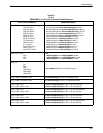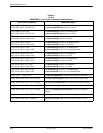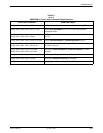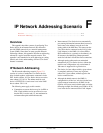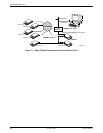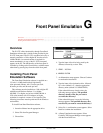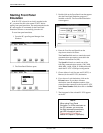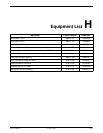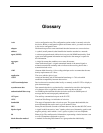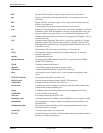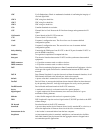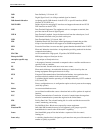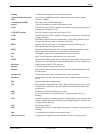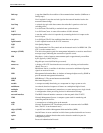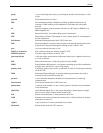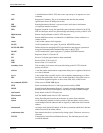
Glossary-13360-A2-GB20-20 December 1996
Glossary
Activ Active configuration area. The configuration option set that is currently active for
the device. Before a configuration option set becomes active, you must save the set
to the Active configuration area.
adapter Hardware that provides some transitional function between two or more devices.
address A symbol (usually numeric) that identifies the interface attached to a network.
agent (SNMP) A software program housed within a device to provide SNMP functionality. Each
agent stores management information and responds to the manager’s request for
this information.
aggregate A single bit stream that combines two or more bit streams.
AIS Alarm Indication Signal. A signal transmitted instead of the normal signal to
maintain transmission continuity and to indicate to the receiving device that a
transmission fault exists.
AMI Alternate Mark Inversion. A line coding technique used to accommodate the ones
density requirements of E1 lines.
application The use to which a device is put.
ASCII American Standard Code for Information Interchange. A 7-bit code which
establishes compatibility between data services.
ASCII terminal/printer Devices that can be attached, either locally or remotely, to the E1 NTU to display or
print alarm messages.
asynchronous data Data transmission that is synchronized by a transmission start bit at the beginning
of a character (five to eight bits) and one or more stop bits at the end.
authenticationFailure trap An SNMP trap that indicates that the device has received an SNMP protocol
message that has not been properly authenticated.
AUX port The auxiliary communications port on the E1 NTU.
AW G American Wire Gauge. An indication of wire size.
bandwidth The range of frequencies that a circuit can pass. The greater the bandwidth, the
more information that can be sent in a given amount of time.
BES Bursty Errored Seconds. Seconds with more than one, but less that 805 CRC errors.
bipolar signal A signal in which successive “ones” (marks, pulses) are of alternating, positive and
negative polarity, and in which a “zero” (space, no pulse) is of zero amplitude.
bit Binary digit. The smallest unit of information, representing a choice between a one
or a zero (sometimes called mark or space).
block allocation method A method of allocating DS0 channels as a group rather than individually.



